The Time Machine — EN
VIII
Explanation
“So far as I could see, all the world displayed the same exuberant richness as the Thames valley. From every hill I climbed I saw the same abundance of splendid buildings, endlessly varied in material and style, the same clustering thickets of evergreens, the same blossom-laden trees and tree-ferns. Here and there water shone like silver, and beyond, the land rose into blue undulating hills, and so faded into the serenity of the sky. A peculiar feature, which presently attracted my attention, was the presence of certain circular wells, several, as it seemed to me, of a very great depth. One lay by the path up the hill, which I had followed during my first walk. Like the others, it was rimmed with bronze, curiously wrought, and protected by a little cupola from the rain. Sitting by the side of these wells, and peering down into the shafted darkness, I could see no gleam of water, nor could I start any reflection with a lighted match. But in all of them I heard a certain sound: a thud – thud – thud, like the beating of some big engine; and I discovered, from the flaring of my matches, that a steady current of air set down the shafts. Further, I threw a scrap of paper into the throat of one, and, instead of fluttering slowly down, it was at once sucked swiftly out of sight.
“After a time, too, I came to connect these wells with tall towers standing here and there upon the slopes; for above them there was often just such a flicker in the air as one sees on a hot day above a sun-scorched beach. Putting things together, I reached a strong suggestion of an extensive system of subterranean ventilation, whose true import it was difficult to imagine. I was at first inclined to associate it with the sanitary apparatus of these people. It was an obvious conclusion, but it was absolutely wrong.
“And here I must admit that I learned very little of drains and bells and modes of conveyance, and the like conveniences, during my time in this real future. In some of these visions of Utopias and coming times which I have read, there is a vast amount of detail about building, and social arrangements, and so forth. But while such details are easy enough to obtain when the whole world is contained in one’s imagination, they are altogether inaccessible to a real traveller amid such realities as I found here. Conceive the tale of London which a negro, fresh from Central Africa, would take back to his tribe! What would he know of railway companies, of social movements, of telephone and telegraph wires, of the Parcels Delivery Company, and postal orders and the like? Yet we, at least, should be willing enough to explain these things to him! And even of what he knew, how much could he make his untravelled friend either apprehend or believe? Then, think how narrow the gap between a negro and a white man of our own times, and how wide the interval between myself and these of the Golden Age! I was sensible of much which was unseen, and which contributed to my comfort; but save for a general impression of automatic organization, I fear I can convey very little of the difference to your mind.
“In the matter of sepulchre, for instance, I could see no signs of crematoria nor anything suggestive of tombs. But it occurred to me that, possibly, there might be cemeteries (or crematoria) somewhere beyond the range of my explorings. This, again, was a question I deliberately put to myself, and my curiosity was at first entirely defeated upon the point. The thing puzzled me, and I was led to make a further remark, which puzzled me still more: that aged and infirm among this people there were none.
“I must confess that my satisfaction with my first theories of an automatic civilization and a decadent humanity did not long endure. Yet I could think of no other. Let me put my difficulties. The several big palaces I had explored were mere living places, great dining-halls and sleeping apartments. I could find no machinery, no appliances of any kind. Yet these people were clothed in pleasant fabrics that must at times need renewal, and their sandals, though undecorated, were fairly complex specimens of metalwork. Somehow such things must be made. And the little people displayed no vestige of a creative tendency. There were no shops, no workshops, no sign of importations among them. They spent all their time in playing gently, in bathing in the river, in making love in a half-playful fashion, in eating fruit and sleeping. I could not see how things were kept going.
“Then, again, about the Time Machine: something, I knew not what, had taken it into the hollow pedestal of the White Sphinx.
Why? For the life of me I could not imagine. Those waterless wells, too, those flickering pillars. I felt I lacked a clue. I felt – how shall I put it? Suppose you found an inscription, with sentences here and there in excellent plain English, and interpolated therewith, others made up of words, of letters even, absolutely unknown to you? Well, on the third day of my visit, that was how the world of Eight Hundred and Two Thousand Seven Hundred and One presented itself to me!
“That day, too, I made a friend – of a sort. It happened that, as I was watching some of the little people bathing in a shallow, one of them was seized with cramp and began drifting downstream. The main current ran rather swiftly, but not too strongly for even a moderate swimmer. It will give you an idea, therefore, of the strange deficiency in these creatures, when I tell you that none made the slightest attempt to rescue the weakly crying little thing which was drowning before their eyes. When I realized this, I hurriedly slipped off my clothes, and, wading in at a point lower down, I caught the poor mite and drew her safe to land. A little rubbing of the limbs soon brought her round, and I had the satisfaction of seeing she was all right before I left her. I had got to such a low estimate of her kind that I did not expect any gratitude from her. In that, however, I was wrong.
“This happened in the morning. In the afternoon I met my little woman, as I believe it was, as I was returning towards my centre from an exploration, and she received me with cries of delight and presented me with a big garland of flowers – evidently made for me and me alone. The thing took my imagination. Very possibly I had been feeling desolate. At any rate I did my best to display my appreciation of the gift. We were soon seated together in a little stone arbour, engaged in conversation, chiefly of smiles. The creature’s friendliness affected me exactly as a child’s might have done. We passed each other flowers, and she kissed my hands. I did the same to hers. Then I tried talk, and found that her name was Weena, which, though I don’t know what it meant, somehow seemed appropriate enough. That was the beginning of a queer friendship which lasted a week, and ended – as I will tell you!
“She was exactly like a child. She wanted to be with me always. She tried to follow me everywhere, and on my next journey out and about it went to my heart to tire her down, and leave her at last, exhausted and calling after me rather plaintively. But the problems of the world had to be mastered. I had not, I said to myself, come into the future to carry on a miniature flirtation. Yet her distress when I left her was very great, her expostulations at the parting were sometimes frantic, and I think, altogether, I had as much trouble as comfort from her devotion. Nevertheless she was, somehow, a very great comfort. I thought it was mere childish affection that made her cling to me. Until it was too late, I did not clearly know what I had inflicted upon her when I left her. Nor until it was too late did I clearly understand what she was to me. For, by merely seeming fond of me, and showing in her weak, futile way that she cared for me, the little doll of a creature presently gave my return to the neighbourhood of the White Sphinx almost the feeling of coming home; and I would watch for her tiny figure of white and gold so soon as I came over the hill.
“It was from her, too, that I learned that fear had not yet left the world. She was fearless enough in the daylight, and she had the oddest confidence in me; for once, in a foolish moment, I made threatening grimaces at her, and she simply laughed at them. But she dreaded the dark, dreaded shadows, dreaded black things. Darkness to her was the one thing dreadful. It was a singularly passionate emotion, and it set me thinking and observing. I discovered then, among other things, that these little people gathered into the great houses after dark, and slept in droves. To enter upon them without a light was to put them into a tumult of apprehension. I never found one out of doors, or one sleeping alone within doors, after dark. Yet I was still such a blockhead that I missed the lesson of that fear, and in spite of Weena’s distress I insisted upon sleeping away from these slumbering multitudes.
“It troubled her greatly, but in the end her odd affection for me triumphed, and for five of the nights of our acquaintance, including the last night of all, she slept with her head pillowed on my arm. But my story slips away from me as I speak of her. It must have been the night before her rescue that I was awakened about dawn. I had been restless, dreaming most disagreeably that I was drowned, and that sea anemones were feeling over my face with their soft palps. I woke with a start, and with an odd fancy that some greyish animal had just rushed out of the chamber. I tried to get to sleep again, but I felt restless and uncomfortable. It was that dim grey hour when things are just creeping out of darkness, when everything is colourless and clear cut, and yet unreal. I got up, and went down into the great hall, and so out upon the flagstones in front of the palace. I thought I would make a virtue of necessity, and see the sunrise.
“The moon was setting, and the dying moonlight and the first pallor of dawn were mingled in a ghastly half-light. The bushes were inky black, the ground a sombre grey, the sky colourless and cheerless. And up the hill I thought I could see ghosts. There several times, as I scanned the slope, I saw white figures. Twice I fancied I saw a solitary white, ape-like creature running rather quickly up the hill, and once near the ruins I saw a leash of them carrying some dark body. They moved hastily. I did not see what became of them. It seemed that they vanished among the bushes. The dawn was still indistinct, you must understand. I was feeling that chill, uncertain, early-morning feeling you may have known. I doubted my eyes.
“As the eastern sky grew brighter, and the light of the day came on and its vivid colouring returned upon the world once more, I scanned the view keenly. But I saw no vestige of my white figures. They were mere creatures of the half light.
“They must have been ghosts,” I said; “I wonder whence they dated.” For a queer notion of Grant Allen’s came into my head, and amused me. If each generation die and leave ghosts, he argued, the world at last will get overcrowded with them. On that theory they would have grown some Eight Hundred Thousand Years hence, and it was no great wonder to see four at once. But the jest was unsatisfying, and I was thinking of these figures all the morning, until Weena’s rescue drove them out of my head. I associated them in some indefinite way with the white animal I had startled in my first passionate search for the Time Machine. But Weena was a pleasant substitute. Yet all the same, they were soon destined to take far deadlier possession of my mind.
“I think I have said how much hotter than our own was the weather of this Golden Age. I cannot account for it. It may be that the sun was hotter, or the earth nearer the sun. It is usual to assume that the sun will go on cooling steadily in the future. But people, unfamiliar with such speculations as those of the younger Darwin, forget that the planets must ultimately fall back one by one into the parent body. As these catastrophes occur, the sun will blaze with renewed energy; and it may be that some inner planet had suffered this fate. Whatever the reason, the fact remains that the sun was very much hotter than we know it.
“Well, one very hot morning – my fourth, I think – as I was seeking shelter from the heat and glare in a colossal ruin near the great house where I slept and fed, there happened this strange thing: Clambering among these heaps of masonry, I found a narrow gallery, whose end and side windows were blocked by fallen masses of stone. By contrast with the brilliancy outside, it seemed at first impenetrably dark to me. I entered it groping, for the change from light to blackness made spots of colour swim before me. Suddenly I halted spellbound. A pair of eyes, luminous by reflection against the daylight without, was watching me out of the darkness.
“The old instinctive dread of wild beasts came upon me. I clenched my hands and steadfastly looked into the glaring eyeballs. I was afraid to turn. Then the thought of the absolute security in which humanity appeared to be living came to my mind. And then I remembered that strange terror of the dark. Overcoming my fear to some extent, I advanced a step and spoke. I will admit that my voice was harsh and ill-controlled. I put out my hand and touched something soft. At once the eyes darted sideways, and something white ran past me. I turned with my heart in my mouth, and saw a queer little ape-like figure, its head held down in a peculiar manner, running across the sunlit space behind me. It blundered against a block of granite, staggered aside, and in a moment was hidden in a black shadow beneath another pile of ruined masonry.
“My impression of it is, of course, imperfect; but I know it was a dull white, and had strange large greyish-red eyes; also that there was flaxen hair on its head and down its back. But, as I say, it went too fast for me to see distinctly. I cannot even say whether it ran on all-fours, or only with its forearms held very low. After an instant’s pause I followed it into the second heap of ruins. I could not find it at first; but, after a time in the profound obscurity, I came upon one of those round well-like openings of which I have told you, half closed by a fallen pillar. A sudden thought came to me. Could this Thing have vanished down the shaft? I lit a match, and, looking down, I saw a small, white, moving creature, with large bright eyes which regarded me steadfastly as it retreated. It made me shudder. It was so like a human spider! It was clambering down the wall, and now I saw for the first time a number of metal foot and hand rests forming a kind of ladder down the shaft. Then the light burned my fingers and fell out of my hand, going out as it dropped, and when I had lit another the little monster had disappeared.
“I do not know how long I sat peering down that well. It was not for some time that I could succeed in persuading myself that the thing I had seen was human. But, gradually, the truth dawned on me: that Man had not remained one species, but had differentiated into two distinct animals: that my graceful children of the Upper-world were not the sole descendants of our generation, but that this bleached, obscene, nocturnal Thing, which had flashed before me, was also heir to all the ages.
“I thought of the flickering pillars and of my theory of an underground ventilation. I began to suspect their true import. And what, I wondered, was this Lemur doing in my scheme of a perfectly balanced organization? How was it related to the indolent serenity of the beautiful Upper-worlders? And what was hidden down there, at the foot of that shaft? I sat upon the edge of the well telling myself that, at any rate, there was nothing to fear, and that there I must descend for the solution of my difficulties. And withal I was absolutely afraid to go! As I hesitated, two of the beautiful Upper-world people came running in their amorous sport across the daylight in the shadow. The male pursued the female, flinging flowers at her as he ran.
“They seemed distressed to find me, my arm against the overturned pillar, peering down the well. Apparently it was considered bad form to remark these apertures; for when I pointed to this one, and tried to frame a question about it in their tongue, they were still more visibly distressed and turned away. But they were interested by my matches, and I struck some to amuse them. I tried them again about the well, and again I failed. So presently I left them, meaning to go back to Weena, and see what I could get from her. But my mind was already in revolution; my guesses and impressions were slipping and sliding to a new adjustment. I had now a clue to the import of these wells, to the ventilating towers, to the mystery of the ghosts; to say nothing of a hint at the meaning of the bronze gates and the fate of the Time Machine! And very vaguely there came a suggestion towards the solution of the economic problem that had puzzled me.
“Here was the new view. Plainly, this second species of Man was subterranean. There were three circumstances in particular which made me think that its rare emergence above ground was the outcome of a long-continued underground habit. In the first place, there was the bleached look common in most animals that live largely in the dark – the white fish of the Kentucky caves, for instance. Then, those large eyes, with that capacity for reflecting light, are common features of nocturnal things – witness the owl and the cat. And last of all, that evident confusion in the sunshine, that hasty yet fumbling awkward flight towards dark shadow, and that peculiar carriage of the head while in the light – all reinforced the theory of an extreme sensitiveness of the retina.
“Beneath my feet, then, the earth must be tunnelled enormously, and these tunnellings were the habitat of the new race. The presence of ventilating shafts and wells along the hill slopes – everywhere, in fact except along the river valley – showed how universal were its ramifications. What so natural, then, as to assume that it was in this artificial Underworld that such work as was necessary to the comfort of the daylight race was done? The notion was so plausible that I at once accepted it, and went on to assume the how of this splitting of the human species. I dare say you will anticipate the shape of my theory; though, for myself, I very soon felt that it fell far short of the truth.
“At first, proceeding from the problems of our own age, it seemed clear as daylight to me that the gradual widening of the present merely temporary and social difference between the Capitalist and the Labourer, was the key to the whole position. No doubt it will seem grotesque enough to you – and wildly incredible! – and yet even now there are existing circumstances to point that way. There is a tendency to utilize underground space for the less ornamental purposes of civilization; there is the Metropolitan Railway in London, for instance, there are new electric railways, there are subways, there are underground workrooms and restaurants, and they increase and multiply. Evidently, I thought, this tendency had increased till Industry had gradually lost its birthright in the sky. I mean that it had gone deeper and deeper into larger and ever larger underground factories, spending a still-increasing amount of its time therein, till, in the end – ! Even now, does not an East-end worker live in such artificial conditions as practically to be cut off from the natural surface of the earth?
“Again, the exclusive tendency of richer people – due, no doubt, to the increasing refinement of their education, and the widening gulf between them and the rude violence of the poor – is already leading to the closing, in their interest, of considerable portions of the surface of the land. About London, for instance, perhaps half the prettier country is shut in against intrusion. And this same widening gulf – which is due to the length and expense of the higher educational process and the increased facilities for and temptations towards refined habits on the part of the rich – will make that exchange between class and class, that promotion by intermarriage which at present retards the splitting of our species along lines of social stratification, less and less frequent. So, in the end, above ground you must have the Haves, pursuing pleasure and comfort and beauty, and below ground the Have-nots, the Workers getting continually adapted to the conditions of their labour. Once they were there, they would no doubt have to pay rent, and not a little of it, for the ventilation of their caverns; and if they refused, they would starve or be suffocated for arrears. Such of them as were so constituted as to be miserable and rebellious would die; and, in the end, the balance being permanent, the survivors would become as well adapted to the conditions of underground life, and as happy in their way, as the Upper-world people were to theirs. As it seemed to me, the refined beauty and the etiolated pallor followed naturally enough.
“The great triumph of Humanity I had dreamed of took a different shape in my mind. It had been no such triumph of moral education and general co-operation as I had imagined. Instead, I saw a real aristocracy, armed with a perfected science and working to a logical conclusion the industrial system of today. Its triumph had not been simply a triumph over Nature, but a triumph over Nature and the fellow-man. This, I must warn you, was my theory at the time. I had no convenient cicerone in the pattern of the Utopian books. My explanation may be absolutely wrong. I still think it is the most plausible one. But even on this supposition the balanced civilization that was at last attained must have long since passed its zenith, and was now far fallen into decay. The too-perfect security of the Upper-worlders had led them to a slow movement of degeneration, to a general dwindling in size, strength, and intelligence. That I could see clearly enough already. What had happened to the Under-grounders I did not yet suspect; but from what I had seen of the Morlocks – that, by the by, was the name by which these creatures were called – I could imagine that the modification of the human type was even far more profound than among the “Eloi,” the beautiful race that I already knew.
“Then came troublesome doubts. Why had the Morlocks taken my Time Machine? For I felt sure it was they who had taken it. Why, too, if the Eloi were masters, could they not restore the machine to me? And why were they so terribly afraid of the dark? I proceeded, as I have said, to question Weena about this Under-world, but here again I was disappointed. At first she would not understand my questions, and presently she refused to answer them. She shivered as though the topic was unendurable. And when I pressed her, perhaps a little harshly, she burst into tears. They were the only tears, except my own, I ever saw in that Golden Age. When I saw them I ceased abruptly to trouble about the Morlocks, and was only concerned in banishing these signs of the human inheritance from Weena’s eyes. And very soon she was smiling and clapping her hands, while I solemnly burned a match.
exuberant ɪgˈzjuːbərənt adj Marked by unrestrained abundance: extravagant, lush, lavish, profuse, opultent
splendid ˈsplɛndɪd adj Brilliant or fine, esp in appearance: excellent, wonderful, marvellous
thicket ˈθɪkɪt n A dense growth of bushes.
evergreen ˈɛvəgriːn n A plant with leaves that do not fall off in winter.
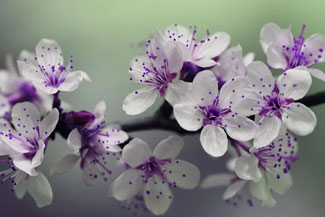 blossom ˈblɒsəm n A flower or a group of flowers.
blossom ˈblɒsəm n A flower or a group of flowers.
laden ˈleɪdn adj Carrying something heavy, or supporting the weight of something heavy.
 fern fɜːn n A plant with leaves shaped like feathers and no flowers.
fern fɜːn n A plant with leaves shaped like feathers and no flowers.
undulate ˈʌndjʊleɪt adj To cause to move in waves.
serenity sɪˈrɛnɪti n The state of being unclouded.
peculiar pɪˈkjuːliə adj Not usual or normal.
wrought rɔːt n Carefully formed or worked into shape.
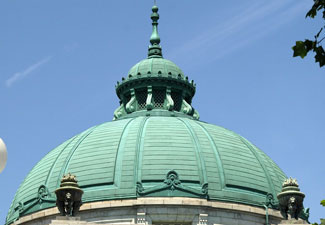 cupola ˈkjuːpələ n Domed roof or ceiling.
cupola ˈkjuːpələ n Domed roof or ceiling.
shafted darkness ⇒ Darkness in which shafts of light go through;
gleam gliːm n A small amount or sign of something.
thud θʌd n Dull sound, as that of a heavy object striking a solid surface.
flare fleə v To shine or burn suddenly and briefly: flame, glow
to set down ⇒ To run/flow down.
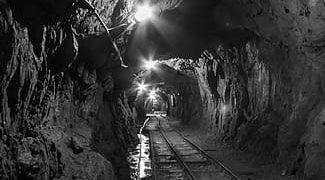 shaft ʃɑːft n An opening or passage in a mine.
shaft ʃɑːft n An opening or passage in a mine.
 scrap skræp n A small piece or portion: fragment
scrap skræp n A small piece or portion: fragment
flutter ˈflʌtə v To wave, flap, or toss about:
suck sʌk v To draw into the mouth by movements of the tongue and lips.
flicker ˈflɪkə v To move waveringly.
scorch skɔːʧ v To make hot: burn, bake
to put together ⇒ To piece together.
to reach a suggestion ⇒ To suggest, to put forth.
subterranean ˌsʌbtəˈreɪniən adj Located or operating beneath the earth’s surface: underground
import ɪmˈpɔːt n Meaning; implication.
to incline to do something ⇒ To have a tendency to do something
sanitary ˈsænɪtəri adj Relating to good health or protection from infection, disease, etc.
conveyance kənˈveɪəns n The moving of something from one place to another: transportation, transport, carriage
convenience kənˈviːniəns n Anything that increases physical comfort: facility, comfort, amenity
utopia juːˈtəʊpjə n An ideally perfect place, especially in its social, political, and moral aspects.
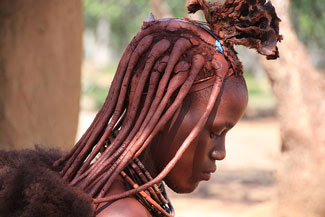 negro ˈniːgrəʊ n A person who has dark skin and who belongs to a race of people who are originally from Africa.
negro ˈniːgrəʊ n A person who has dark skin and who belongs to a race of people who are originally from Africa.
to take back ⇒ To take something to the place it came from.
 parcel ˈpɑːsl n Something wrapped in paper or in a large envelope to be sent by post.
parcel ˈpɑːsl n Something wrapped in paper or in a large envelope to be sent by post.
and the like ⇒ And the others of that kind.
at least ⇒ if nothing else.
apprehend ˌæprɪˈhɛnd v To grasp the meaning of; understand, especially intuitively: perceive, understand, grasp, comprehend, figure out, pick up
sensible of ⇒ Aware of.
sepulchre, aм. sepulcher ˈsɛpəlkə n Burial place for human remains: tomb, vault, catacomb
crematorium, crematory ˌkrɛməˈtɔːrɪəm, ˈkrɛmətəri pl crematoria ˌkrɛməˈtɔːrɪə n A place or establishment for the incineration of dead person’s corpses in a furnace.
suggestive səˈʤɛstɪv adj Bringing thoughts, memories, or feelings into the mind.
 tomb tuːm n Grave or other place of burial.
tomb tuːm n Grave or other place of burial.
it occurred to me ⇒ it came to/entered my mind.
to put a question to someone ⇒ To ask someone a question.
infirm ɪnˈfɜːm adj Weak because of old age or illness.
decadent ˈdɛkədənt adj Having low morals and a great love of pleasure, money, fame, etc.
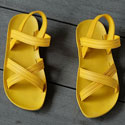 sandal ˈsændl n A shoe consisting of a sole fastened by straps to the foot.
sandal ˈsændl n A shoe consisting of a sole fastened by straps to the foot.
specimen ˈspɛsɪmɪn n Representative of a group or class: case, example, instance, sample
metalwork ˈmɛt(ə)lˌwɜːk n Metal objects, or the metal parts of something.
no vestige of ⇒ no trace of.
importation ˌɪmpɔːˈteɪʃən n The act of importing products.
 pedestal ˈpɛdɪstl n An architectural base for a statue.
pedestal ˈpɛdɪstl n An architectural base for a statue.
for the life of someone ⇒ Despite one’s best efforts; to any degree whatsoever.
 pillar ˈpɪlə n An upright structure of stone, brick, metal, etc, that supports a superstructure or is used for ornamentation.
pillar ˈpɪlə n An upright structure of stone, brick, metal, etc, that supports a superstructure or is used for ornamentation.
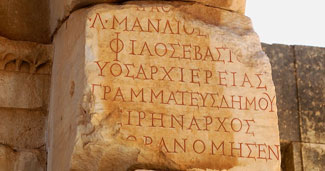 inscription ɪnˈskrɪpʃən n Something inscribed, esp words carved or engraved on a coin, tomb, etc.
inscription ɪnˈskrɪpʃən n Something inscribed, esp words carved or engraved on a coin, tomb, etc.
interpolate ɪnˈtɜːpəʊleɪt n To put or set into, between, or among other things: introduce, insert, interpose, interject
therewith ðeəˈwɪθ adv In addition to; right after that.
to make up of ⇒ To grasp, to comprehend.
to make friends with ⇒ To become a friend of a person.
cramp kræmp n Sudden, spasmodic muscular contraction causing severe pain.
downstream ˌdaʊnˈstriːm n With or in the direction of the current of a body of water flowing in a channel, river, or brook.
deficiency /dɪˈfɪʃənsi n The state or condition of lacking something: weakness, imperfection
to slip off ⇒ To push off clothing with a quick and easy movement.
wade weɪd v To walk in or through water.
mite maɪt n Very small object or creature.
to bring someone round ⇒ To bring someone back to consciousness, as after a fainting spell or coma.
to get to ⇒ To reach, to arrive at.
gratitude ˈgrætɪtjuːd n A feeling of appreciation or thanks.
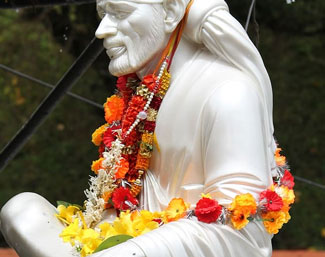 garland ˈgɑːlənd n A wreath of flowers, leaves, or other material, worn for ornament or as an honor or hung on something as a decoration.
garland ˈgɑːlənd n A wreath of flowers, leaves, or other material, worn for ornament or as an honor or hung on something as a decoration.
desolate ˈdɛsəlɪt adj Bereft of friends or hope: sad, forlorn, lonely, lonesome, deserted
at any rate ⇒ in any case.
to do one’s best ⇒ To make every possible effort.
arbour ˈɑːbə n Shady resting place, formed by tree branches, shrubs, etc.
queer kwɪə adj Deviating from the customary: strange, curious, odd, peculiar, singular, quaint, weird
out and about ⇒ Outside the house; outdoor
it goes to one’s heart to do smoething ⇒ To make someone feel pity or bad to do something.
at last ⇒ After a long wait; finally.
exhausted ɪgˈzɔːstɪd adj Drained of strength or energy: tired
plaintive ˈpleɪntɪv adj Full of sorrow: doleful, mournful, woeful, rueful
to carry on ⇒ To have.
flirtation flɜːˈteɪʃən n Superficial and usually temporary romance: dalliance
distress dɪsˈtrɛs n Acute anxiety, pain, or sorrow or anything that causes it: bother, hassle, fuss
expostulation ɪksˌpɒstjʊˈleɪʃən n An expression of opposition by argument: objection, protest, remonstrance
frantic ˈfræntɪk adj Wild or marked by uncontrolledwith emotion, excitement or emotion: frenzied
devotion dɪˈvəʊʃən n Great love, interest, care and support for somebody or something: dedication, commitment, devotedness, adoration
inflict ɪnˈflɪkt v To cause harm or damage on someone or something in order to make them suffer it: impose
to be fond of someone ⇒ To have a strong liking or affection for someone.
futile ˈfjuːtaɪl adj Having no useful result: useless, vain, unsuccessful, barren, ineffective
came over ⇒ To arrive in sight; to be manifest; to appear.
dread drɛd v To fear something that will or might happen.
dreadful ˈdrɛdfʊl adj Exceptionally bad or displeasing, causing fear or terror.
singularly ˈsɪŋgjʊləli adv In a way that is very noticeable or unusual.
something sets me thinking ⇒ something provokes my thinking.
drove drəʊv n Large mass of people acting as a body: flock
tumult ˈtjuːmʌlt n An interruption of public peace: disturbance, commotion, turbulence, fuss, uproar, stir
apprehension ˌæprɪˈhɛnʃ(ə)n n Fear that something bad or unpleasant is going to happen: fear, dread, anxiety, worry, concern
blockhead ˈblɒkhɛd n A stupid person usually not very intelligent: fool, imbecile, idiot
slumber ˈslʌmbə v To be asleep: sleep, nap, doze
my story slips away from me ⇒ My words/thoughts escape my mind.
anemone əˈnɛməni n Kind of woodland flower, usually white, pale-blue or dark-red.
feel fiːl v To touch, to learn about something by touching, holding etc.
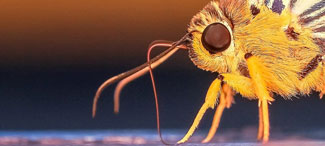 palp pælp n An elongated appendage usually found near the mouth in insects, the functions of which may include sensation, locomotion, and feeding.
palp pælp n An elongated appendage usually found near the mouth in insects, the functions of which may include sensation, locomotion, and feeding.
to wake with a start ⇒ To wake with a sudden movement of surprise, fear etc.
greyish ˈgreɪɪʃ adj Somewhat grey.
flagstone ˈflægstəʊn n A hard, flat piece of stone that is used for making paths.
to make a virtue of necessity ⇒ To pretend to do something with willingness although it is necessary and obligatory to do it anyway.
pallor ˈpælə n Extreme or unnatural paleness.
mingle ˈmɪŋgl v To mix together but still stay recognizable: mix, commix, unify, amalgamate
ghastly ˈgɑːstli adj Very shocking or horrible.
sombre ˈsɒmbə adj Dark or dull in colour.
solitary ˈsɒlɪtəri adj Being the only one; single and isolated from others: lone, lonesome, only, sole
ape eɪp n A large primate that lacks a tail, including the gorilla, chimpanzees, orangutan, and gibbons.
leash liːʃ n Set of three.
I did not see what became of them ⇒ I did not see what happened with them.
indistinct ˌɪndɪsˈtɪŋkt adj Not clearly perceived: faint, vague, dim, obscure, hazy, shadowy
vivid ˈvɪvɪd adv Very clear, powerful, and detailed in your mind.
vestige ˈvɛstɪʤ n Remnant that indicates the former presence of something: trace, remains
whence wɛns adv From what place or circumstance.
Grant Allen ⇒ (1848 – 1899) Canadian science writer and novelist; a public promoter of of the evolution doctrine and an expounder of Darwinism.
years hence ⇒ years later; hence hɛns adv From this time.
jest ʤɛst n Something said or done to cause laughter: joke
startle ˈstɑːtl v To surprise or frighten someone suddenly but not seriously: frighten, scare, terrify, alarm
to be destined to do something ⇒ To be fated/ doomed to do something
to take possession of ⇒ To seize, to grip.
to account for ⇒ To give an explanation of.
Charles Robert Darwin ⇒ (1809 – 1882) An English naturalist, geologist and biologist, best known for his contributions to the science of evolution.
blaze bleɪz n A strong flame that burns brightly: blazing
glare gleə n Unpleasantly bright light.
clamber ˈklæmbə v To climb or crawl in an awkward way.
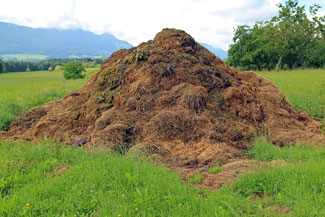 heap hiːp n A large, disordered pile of things: pile
heap hiːp n A large, disordered pile of things: pile
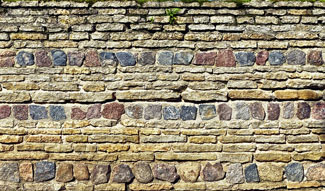 masonry ˈmeɪsnri n Stonework or brickwork.
masonry ˈmeɪsnri n Stonework or brickwork.
by contrast with ⇒ in contrast to, in comparison with.
impenetrably ɪmˈpɛnɪtrəbli adv In an impossible to pass or see through way.
grope grəʊp v To search uncertainly: feel, fumble
halt hɔːlt v To stop: stay, check, cease, arrest
spellbound ˈspɛlbaʊnd adj Entranced by a spell.
luminous ˈluːmɪnəs adj Softly bright or radiant.
dread drɛd n Fearful expectation or anticipation.
clench klɛnʧ v To hold something tightly.
steadfastly ˈstɛdfəstli adj With resolute determination: firmly, unwaveringly
glare gleə v To stare fiercely and angrily.
eyeballs ˈaɪbɔːlz n The whole round ball that forms an eye.{eyeball
ill-controlled ˈɪlkənˈtrəʊld adj Revealing one’s emotional state.
at once ⇒ without delay; immediately.
dart dɑːt v To thrust or move suddenly or rapidly: dash, scoot, scud, flash, shoot, whip
to have one’s heart in one’s mouth ⇒ To be very frightened.
blunder ˈblʌndə v To move clumsily in an unsteady way, as if you cannot see properly: stumble, lurch, wallow, bumble
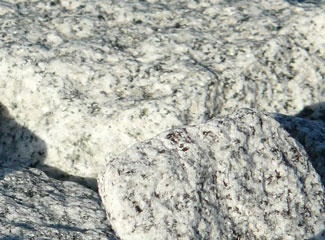 granite ˈgrænɪt n A usually light-colored, coarse-grained igneous rock composed mostly of quartz, feldspar, and mica, one of the most common rocks in the crust of continents.
granite ˈgrænɪt n A usually light-colored, coarse-grained igneous rock composed mostly of quartz, feldspar, and mica, one of the most common rocks in the crust of continents.
stagger ˈstægə v To walk or move unsteadily, almost falling over.
dull dʌl adj Not shiny.
flaxen ˈflæksən adj Having the pale grayish-yellow colour of flax fiber.
all-fours ˈɔːlˈfɔːz adj All four limbs of a person.
 forearm ˈfɔːrɑːm n The part of a person’s arm extending from the elbow to the wrist or the fingertips.
forearm ˈfɔːrɑːm n The part of a person’s arm extending from the elbow to the wrist or the fingertips.
obscurity əbˈskjʊərɪti n Darkness; dimness; indistinctness.
well-like ⇒ Looking like a well (a place for obtaining water from an underground source).
shudder ˈʃʌdə v To shiver convulsively: shake, tremble, quiver, quaver
the truth dawned on me ⇒ The truth became clear to me.
descendant dɪˈsɛndənt n A person considered as descended from some ancestor or race: offspring, scion
bleach bliːʧ v To lose normal colouration: blanch, pale, etiolate
obscene ɒbˈsiːn adj Beyond all reason: ridiculous, monstrous, preposterous, shocking
nocturnal nɒkˈtɜːnl adj Relating to or occurring in the night: night, nightly
heir eə n Someone who by law receives wealth, proprty etc. when the owner dies.
 lemur ˈliːmə n Small, living in trees, chiefly nocturnal mammal of Madagascar and the Comoro Islands, usually having large eyes, a foxlike face, and woolly fur.
lemur ˈliːmə n Small, living in trees, chiefly nocturnal mammal of Madagascar and the Comoro Islands, usually having large eyes, a foxlike face, and woolly fur.
indolent ˈɪndələnt adj Resistant to exertion and activity: idle, lazy, shiftless, slothful
serenity sɪˈrɛnɪti n A feeling of being calm or peaceful.
withal wɪˈðɔːl adv Besides.
amorous ˈæmərəs adj Indicaitve of love: erotic, amatory
distressed dɪsˈtrɛst v Feeling or showing extreme unhappiness, strain, anxiety, suffering or pain: bother, hassle, fuss
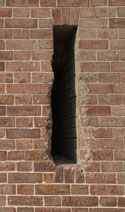 aperture ˈæpətjʊə n An opening, such as a hole or slit: opening
aperture ˈæpətjʊə n An opening, such as a hole or slit: opening
vague veɪg adv In not clearly perceptible manner: faintly, dimly, unclearly
emergence ɪˈmɜːʤəns n The becoming visible: egress, issue
.for instance ⇒ for example.
 owl aʊl n Nocturnal bird of prey, having a broad head with large, forward-directed eyes that are usually surrounded by disks of modified feathers.
owl aʊl n Nocturnal bird of prey, having a broad head with large, forward-directed eyes that are usually surrounded by disks of modified feathers.
and last of all ⇒ finally.
fumble ˈfʌmbl v To proceed in an unsteady, faltering manner: stagger, shuffle
awkward ˈɔːkwəd n Hard to handle; inconvenient to use, uncomfortable.
carriage ˈkærɪʤ n Characteristic way of bearing one’s body: bearing, posture
 retina ˈrɛtɪnə n The innermost light-sensitive membrane covering the back wall of the eyeball.
retina ˈrɛtɪnə n The innermost light-sensitive membrane covering the back wall of the eyeball.
habitat ˈhæbɪtæt n The natural environment of something: home, haunt
in fact ⇒ in reality or in truth; actually.
ramification ˌræmɪfɪˈkeɪʃən n Subordinate part extending from a main body.
plausible ˈplɔːzəbl n Apparently reasonable and credible, and therefore convincing: believable.
I went on to assume ⇒ I continued assuming that.
how haʊ n A manner or method of doing something.
anticipate ænˈtɪsɪpeɪt v To know in advance: see, foresee
it fell far short of the truth ⇒ it was far from true.
clear as daylight ⇒ Easily seen or understood; obvious, evident.
grotesque grəʊˈtɛsk adj With no reference to reality or common sense: fantastic, bizarre, far-fetched
utilize ˈjuːtɪˌlaɪz v To put into use: use, employ, exploit
birthright ˈbɜːθraɪt n A right that you have because you were born into a particular position, family, place, etc., or because it is a right of all people.
I mean that ⇒ I have in mind that.
due to ⇒ because of, owing to.
refinement rɪˈfaɪnmənt n An improvement or elaboration.
rude ruːd adj Not showing concern or respect for the rights and feelings of other people: uncivil
to shut in ⇒ To isolate, not allow to go out.
intrusion ɪnˈtruːʒən n Illegal entry upon a property.
temptation tɛmpˈteɪʃən n Something that seduces or has the quality to seduce: lure, attraction, fascination, appeal, inducement
on the part of ⇒ From the point of.
intermarriage ˌɪntəˈmærɪʤ n Marriage between people of different religions, tribes, castes, ethnicities, or racial groups.
at present ⇒ At this time, now.
retards rɪˈtɑːdz v To make slow or delay the development or progress of an action, process, etc.
stratification ˌstrætɪfɪˈkeɪʃən n Formation of layers in society.
cavern ˈkævən n Large underground chamber.{
starve stɑːv v To die or perish from lack of food or nourishment.
suffocate ˈsʌfəkeɪt v To kill by preventing access of air.
arrears əˈrɪəz n pl. An unpaid, overdue debt.
constitute ˈkɒnstɪtjuːt v Create and charge with a task or function: appoint, name, nominate
rebellious rɪˈbɛljəs adj Fighting against a government and refusing to obey rules or authority.
in their way ⇒ in their own mode/ manner.
as it seemed to me ⇒ As it appeared to me.
etiolate ˈiːtɪəʊleɪt v To lose normal coloration; turn pale: bleach, blanch, pale
pallor ˈpælə n Extreme or unnatural paleness.
at the time ⇒ At a particular moment in the past; then.
cicerone ˌʧɪʧəˈrəʊni n pl ciceroni ˌʧɪʧəˈrəʊniː Italian A guide for sightseers.
utopian juːˈtəʊpjən adj Not compatible with reality.
supposition ˌsʌpəˈzɪʃən n Belief used as the basis for something: theory, hypothesis
attain əˈteɪn v To gain as an objective: achieve
zenith ˈzɛnɪθ n The highest state: height, peak, climax, culmination, apogee
to fall into decay ⇒ To become the serious state mentioned.
degeneration dɪˌʤɛnəˈreɪʃən n Descent to a lower level or condition: decline, deterioration, decadence, worsening
dwindle ˈdwɪndl n To grow gradually less: reduce, diminish, lessen, shrink, decrease
by the by ⇒ by the way.
shiver ˈʃɪvə v To shake slightly because of cold, fear, etc: tremble, shudder, vibrate, shake, quake
unendurable ˌʌnɪnˈdjʊərəbl adj Not capable of being tolerated: intolerable, unbearable
to burst into tears ⇒ To start crying suddenly.
abruptly əˈbrʌptli adv Quickly and without warning: suddenly, hastily, hurriedly
banish ˈbænɪʃ v To drive away.
inheritance ɪnˈhɛrɪtəns n The process of genetic transmission of characteristics from parent or ancestor to offspring.
clap klæp n To strike the palms of the hands against one another to make a sound, usually repeatedly, especially to express approval.
solemnly ˈsɒləmli adj Seriously and without any humour.